Other Links
Editorial Board
- Editor - Bill Kenny
- London Editor-Melanie Eskenazi
- Founder - Len Mullenger
Google Site Search
SEEN AND HEARD OPERA REVIEW
Kunqu
Opera, The Peony Pavilion :
Suchow Kunqu Opera Company/ Orchestra conducted by Zhou Youliang
Sadler’s Wells, London 3, 4 and 5.6.2008 (AO)
Kunqu Opera emerged as a distinct form six hundred years ago, at the
beginning of the Ming Dynasty but it builds on centuries of art long
before that. For many, kunqu epitomises the ultimate in artistic
refinement because it unites so many sophisticated genres, such as
literature, history, music, dance, ethics. To understand Chinese
aesthetics, study kunqu.
Most people nowadays won’t know the original novel and its
background, and don’t have the stamina to sit through 20 hours of
high flown art. Thus Professor Pai Hsienyung created this new
edition, lasting only 9 hours. It is faithful to the essence of the
original but can also be enjoyed by modern audiences. Professor Pai,
son of a much loved hero in 20th century China, has
devoted his life to kunqu, so this edition is definitive. Kunqu was
eclipsed in the turbulent late 20th century by other
kinds of Chinese opera, such as the brasher, more audience-friendly
Beijing opera, which is very different. Professor Pai’s scholarship
has contributed to the revival of kunqu in recent years and restored
it to pre-eminence. In 2001, UNESCO declared kunqu a masterpiece of
world cultural heritage.
Completely unknown to her, the man in her dreams is real, and he
too, has the very same dream. Indeed, it means so much to him that
he adopts a new name, Liu Mengmei, which means “dream of willow and
plum”. In tradition, name changes mark significant life events. The
young man comes from an ancient scholarly family that lost all their
money. He was brought up by the family gardener. Yet the humble
gardener understands dreams too, and insists his “Young Squire” sit
the Imperial Examinations. It’s hard to stress just how important
these examinations were in that society, but to understand the opera
it does help to know what they meant. These examinations guaranteed
success and status. Men would spend years trying, and many committed
suicide if they failed. So Liu ventures off but is caught up in a
cataclysmic storm, and finds shelter in a deserted mansion. He, too,
ventures into the wild garden and finds Du Liniang’s portrait. She
is the girl in his dreams.
Tang Xianzu, the author, knows that the ways of the world don’t
allow for dreams and something as bizarre as resurrection from the
dead. Du Liniang’s tutor, Chen Zuiliang, is a venal fool who failed
his Imperial examinations and ended up tutoring a young girl who was
a better scholar than he was. Chen sets off to see Du Liniang’s
father, Du Bao, who is the leader of Imperial armies fighting a
barbarian invasion. (Another “Freudian” clue). The rebels are led
by Li Quan, but the real brains behind him is his vivacious wife,
Duchess Yang. She’s quite a character, who used to be a pirate
before doing a deal with the barbarians and becoming ennobled. When
Du Bao bribes her to lift the siege on the city, she cheerfully goes
back to her wild old ways as a pirate, outside society. So much for
officialdom and public status!
Kunqu opera also illustrates other principles of Chinese art. In
Chinese painting, for example, blank spaces are an essential part of
the composition. Similarly, Chinese gardens are designed to
represent miniature vistas from landscape. A kunqu stage isn’t
cluttered with scenery. A group of soldiers stand in formation,
some with oars, which they move in swift unison, while the orchestra
builds up fast rhythmic crescendi. The combination of music and
movement creates an image of huge armies descending down river. The
sedan chair in which the elderly gardener is carried is “formed”
instantly when the Imperial Guards lower their banners to make two
planks. The gardener sits on one, his feet resting on the other.
His expression and joyful singing show how thrilled he is at being
so honoured. You don’t need to see the details, you can hear them.
Cast :
Du Liniang : Shen
Fengying
Liu Mengmei : Yu Jiulin
Spring Fragrance : Lü jia, Zhou Xiaoyue
Sister Stone : Tao Hongzhen
Chen Ziuliang : Shen Zhiming
Du Bao : Qu binbin
Madame Du : Chen Lingling
Judge Hu in hell : Tang Rong
Li Quan : Tang Rong
Duchess Yangf : Lü Jia
General Producer/Artistic Director : Kenneth Pai Hsienyung
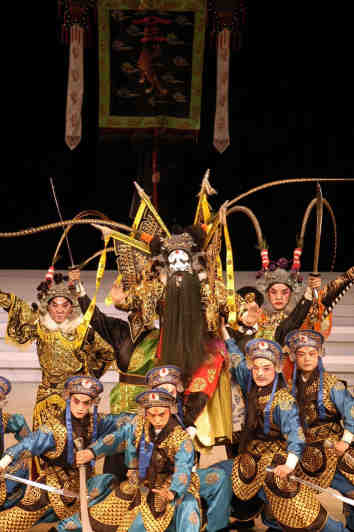
The Battle
London was truly fortunate to receive this production of The
Peony Pavilion, one of the great classics of the repertoire.
The Peony Pavilion, or Moudan Ting in Chinese, is a story
every Chinese knows, rather like most westerners know Romeo and
Juliet. It’s based on a novel written in 1598 by the great
scholar Tang Xianzu, a huge sprawling work in the style of classic
Ming literature, full of references to poetry, history and
philosophy. The original opera lasts over 20 hours, with over 100
arias and other set pieces. In the past, most educated people would
have known the background well enough that they could pick up on the
many connotations and allusions, gaining extended pleasure beyond
what they saw and heard on stage. Nonetheless, Chinese opera is by
no means elitist. Until fairly recently, most rural Chinese were
illiterate, yet opera in some form was standard entertainment.
There are many regional variants of kunqu, though Beijing opera is
different, so you don’t need to be a scholar to enjoy Chinese opera,
because it operates on many levels. Kunqu has survived for centuries
because its fundamental appeal is to the human spirit. As these
performances showed, there’s nothing to stop people having a good
time with Chinese opera even if they know nothing of Chinese
culture.
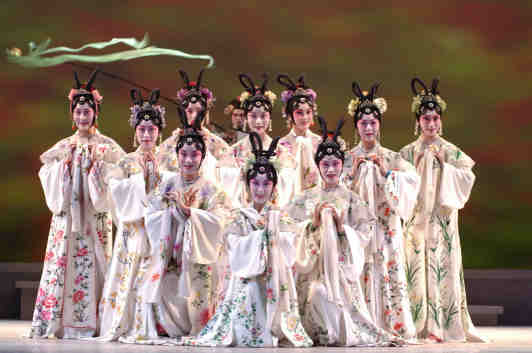
The Immortals
Why does kunqu hold such fascination ? It is surprisingly modern
because it addresses universal human feelings. Tang Xianzu, the
author of The Peony Pavilion, understood the significance of
dreams and inner emotion long before Freud wrote his psychology.
Tang wrote what are now called “The Four Dreams”, four novels which
involve dreams and are an essential part of the kunqu canon. The
Peony Pavilion centres on dreams. The heroine, Du Liniang is a
talented but sheltered girl who enters a secret garden she’s
forbidden to enter. It’s neglected and turning wild, but plants
flourish in profusion. You don’t need to know Freud to know what
this means. In the pavilion in the garden, she falls asleep and
dreams about a young man who gives her a branch of willow. So
intense is this dream, that the real world loses meaning. Du Liniang
resolves to die rather than live without love. But she has such
faith that she paints her self-portrait and hides it in a rock. If
fate wills, it will be found.
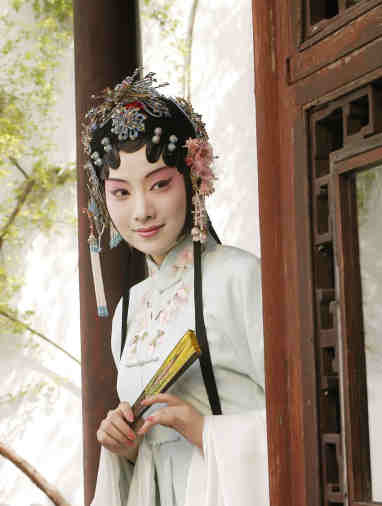
Du Liniang
When Du Linaing died, she entered the netherworld. But the Judge of
Hell was moved by the story of her dream. If it was her fate to
marry the man, she should stay in limbo until she finds him. So Du
returns to her old home as a ghost and meets Liu Mengmei. Then they
have to restore her body, which is intact. Helped by Stone Sister,
a Daoist abbess, Liu digs up the grave and Du Liniang is
resurrected. Love triumphs over the laws of life and death. If
love can defeat the laws of hell, what chance then for the laws of
the world ?
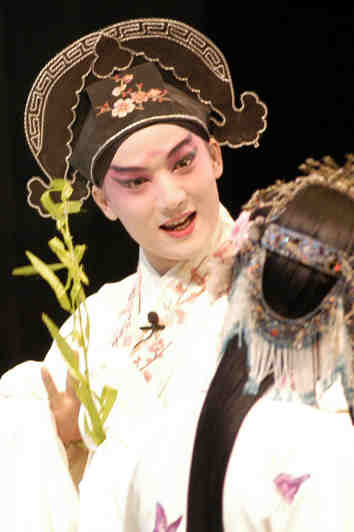
Liu Mengmei
The social observation in The Peony Pavilion is so trenchant
that it’s still valid today. Yet an undercurrent of irreverence
flows throughout the opera, which tells us a lot more about Chinese
values than superficial clichés would have us assume. Of course the
conventions of Confucian order hold society together but the human
spirit is irrepressible. Du Linang’s maid, Spring Fragrance, is a
cheeky minx who doesn’t let her lowly status get in the way of
having fun. Sister Stone, the abbess who helps Liu Mengmei
resurrect his lover, leaves her husband on their wedding night to
become a nun. She doesn’t do “that yin yang business”. Fate can
suddenly reverse things from one extreme to another and the only
security lies in virtue. Liu Mengmei won First Place in the Imperial
Examinations, but didn’t know because he’s gone to do filial duty to
Du Liniang’s father, who, understandably, didn’t believe the story
of his daughter’s resurrection. So Liu is tortured for being a
grave robber. But because Liu had treated his gardener well, the
old man travelled through the war zone to find him, and was able to
identify him as the First Place Scholar the Emperor was searching
for. Chen Zuiliang, the incompetent tutor, wins honour without
virtue, because his claims to have defeated the rebels were
dishonest. Yet, if he hadn’t been such a fool, Du Liniang wouldn’t
have been so bored that she ventured into the garden place and found
the peony pavilion. Liu Mengmei wins over the Emperor because he’s
patently a virtuous person.
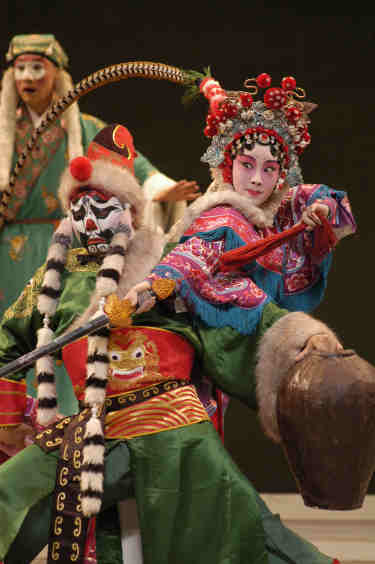
Duchess Yang
The spirits of nature and of the garden are conveyed by actors
dressed in silk, ornately embroidered with flowers. They fill the
stage, their sleeves fluttering and swaying. Flowers move in the
breeze, and fragrance is invisible. How beautifully these dancers
convey the sensual lushness of a real garden ! No painted backdrop
can compare. Even the splendour of the Emperor’s chamber is
suggested not by artefacts but by the costumes and demeanour of his
entourage. This timeless, elegant simplicity is effective because
it concentrates attention on the singing and music. There are
parallels with Greek tragedy and early European theatre. The
assumption that opera “has” somehow to be literal is very recent
indeed and by no means the norm. Kunqu shows just how effective
minimalism can be. Significantly, Chinese opera was fashionable in
the west in the 1920’s and 30’s when European theatre was undergoing
a transformation. Bertholt Brecht, for example, was said to admire
Mel Lanfang, perhaps the most famous Chinese opera star in modern
times.
Expression in kunqu opera always derives from the human form, not
from mechanical devices like scenery. There are hundreds of
different gestures, creating a whole extra language for
communication. Finger movements are exquisitely subtle. It makes a
difference how they are arranged and how they move. Similarly, when
an actor holds his foot in a certain angle, it can indicate setting
out on a long journey, or an arduous climb. Audiences learn to
“read” these clues quite easily, just as ballet audiences quickly
pick up on the stylised gestures in dance. I was surprised that
there weren’t more dancers in the audience in London, given that it
was Sadler’s Wells. Dancers would have been able to pick up the
logic, and learned a lot.
Every gesture serves a purpose. Movement is extremely fluid and
graceful, so when the actors do stop and hold a pose, it’s
significant. One unique feature of Chinese opera is shui xiu, or
“water sleeves”, where the very clothes people wear become an
extension of meaning. For example, quietly flipping the sleeve ends
over indicates alertness. Letting the sleeves flutter horizontally
creates the impression of sustained, movement over space. There’s a
whole vocabulary of gesture, but the skill comes from how an
individual actor uses them in combination. The scene in which the
young scholar ventures out into the world and is tossed by a storm
was remarkably vivid because Yu Jiulin, who played the role, managed
to “act with his sleeves”, so they seemed at once part of him and
yet part of the wind and the rain beating on him. It was a tour de
force, though only one of many in this fine production. This
demonstrates one of the reasons why Chinese opera endures so well.
Within the stylisation, there’s room for spontaneity and personal
freedom.
Chinese music isn’t fixed into notation like western music. Again,
it uses a language of gestures like the actors do, varying and
adapting to the action on stage. It’s closer to improvisation,
because the aim is perfect coordination between action and sound.
When the percussion beats a steady sequence gradually increasing in
speed, it can indicate something is about to happen before it does.
Chinese opera orchestras are like giant chamber ensembles,
interacting with the singers and actors as well as with each other.
There were fewer than twenty musicians in the pit yet their range
was huge. Sometimes all you would hear was a single, plaintive
ocarina, as silent and as poignant as a distant bird. At other
times, the orchestra could create the tumult of a battle scene,
trumpets blaring, percussion evoking thundering hooves. Chinese
music proves that atonal and dissonant music is perfectly natural,
and capable of expressing profound emotion. Western musicians can
learn a lot from these very different approaches to rhythm, tempi
and interval. Just as people interested in contemporary western
music are often attuned to early western music, they might
interesting ideas in Chinese music.
The first production of Professor Pai’s Peony Pavilion in
China in 1998 received ecstatic reviews. I missed it by days, and
was frustrated, especially when my friend, who loves both western
and Chinese opera, told me how much she’d enjoyed it. Later I got
the DVD set, bound like a presentation book in pink silk, and saw
what she meant ! The DVDs are being reissued in more commercial
format, so look out for them. The cast we heard in London is the
same illustrious cast that did the premiere. The Suchow Kunqu Opera
Company is in a special position because Suchow was one of the
centres of kunqu tradition. It’s also one of the most beautiful
cities in China, famed for its gardens, some of which are over 1000
years old. It was a place that attracted scholars, poets and
artists, so standards where extremely high. But you don’t have to
be a scholar or an artist to appreciate kunqu. So what if the sounds
may seem alien and the conventions different ? By now most people
have been exposed enough to cultures other than their own that they
can accept other cultures on their own terms. Fundamentally, kunqu
opera is universal because it appeals on a direct human, emotional
level, accessible to anyone who opens their heart.
All pictures
©
Sadler's Wells
Back to Top Cumulative Index Page
